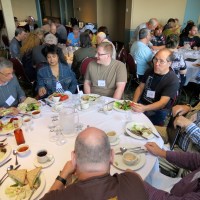Allama Shah Ahmed Shafi is a very powerful man in Bangladesh. This Deobandi scholar has a huge followers. A few months ago he called for a general strike, half a million people came to the street to occupy Dhaka. In his new public meeting, he spoke against women’s rights. Speaking against women and their rights is nothing new in Bangladesh. Religious, political, societal, cultural leaders use their own fine languages to suppress,oppress,denigrate, abuse, humiliate women.
Allama said,
Women should take care of furniture, bring up children and stay within the confines of their homes!
“You women should stay within the four walls of your houses.
“Sitting inside your husband’s home you should take care of your husband’s furniture and raise your children, your male kids. These are your jobs. Why do you have to go outside?”
“Why are you sending your daughters to work in garment factories? She goes to work after Fajr at 7/8:00am and does not come back even at 8/10/12 at night.”
“You do not know which man she is hanging out with. You do not know how much zina [unlawful sexual activity] she is getting involved in. Through zina, she is earning money, which does not bring prosperity [Barkat].”
“Women go to schools, colleges and universities; let them study up to class four or five. After marriage, keeping record of their husbands’ finances is enough for them.
“You are spending lakhs of taka for sending them to schools, colleges and universities. But, after a few days, your daughter will get a husband of her own, enter into a love marriage or a court marriage and elope. She will not remember her father.”
“Students, both boys and girls, have mobile phones. The male students collect the phone numbers of female ones while female students go to schools and colleges and collect the phone numbers of male students. This is what is going on in the name of education.”
“Do not come out of your house. Do not roam naked on roads and at stations, markets and fields. Beware! Do not go shopping. Ask your husband and son to do the shopping. Why would you go? Ask your husband to bring this thing and that. You just sit and order your son. Why do you have to take the trouble?”
“If a small boy is sucking on a piece of tamarind…. when you walk beneath a tamarind tree… when you go by a tamarind shop in the market, it makes your mouth water; women are worse than that.”
“Seeing women, your heart salivates in desire — desire to marry them, to enter into a love marriage or a court marriage.”
“These women are like tamarinds. If you are studying with women day and night, your heart will not be able to control itself. You are walking on the streets and shaking hands [with women]; you will not be able to control your heart.
“No matter how pious you may be, if you shake hands with a woman, your heart will start having evil intentions. This is a Zina of the mind, Zina of the heart, and soon it will turn into a real Zina.
“If an elderly man tells me that he does not start having evil intentions when he sees a woman, then I will tell him: ‘Old man! You are suffering from impotency, your manhood has gone. That is why you do not get evil intentions when you see a woman.’”
In his sermon, Shafi strongly opposed family planning and birth control. He asked men to have four wives to increase the size of Muslim community.
I heard that many people in Bangladesh even who believe in Islam are angry with Allama because of his vulgar talk. But the truth is, Allama did not say anything that Allah didn’t say in the Quran or Muhammad didn’t say in the Hadiths. Allah suggested men to have four wives if necessary. Allama did the same. Muhammad asked women to stay at home, and to not go outside, so did Allama. Muhammad suggested women not to go in front of men who are not their close relatives. Allah and Muhammad both endorsed patriarchal system for society, which made men superior to women. Women are advised to run to their husbands whenever they called them for sex, it is women’s religious duty to do household chores, to bear and rear children, to take care of the house belong to their husbands and obey their husbands, their masters. These are from the sacred hadiths. I have no idea why the believers of Islam should angry with Allama. Allama promoted patriarchy the way Allah and Muhammad promoted. Almost all the people, from politicians to playwrights, promote patriarchal system. The difference between them and Allama is Allama is innocent and honest. He hasn’t learnt yet the politically correct language like other respected misogynist gentlemen.
Allama compared women with tamarinds, it is the only thing I found new in Allama’s talk. Women are often compared with fruits, flowers and vegetables by poets, artists and all kinds of people. Those fruits etc. may smell and taste better than tamarinds, but the purpose of comparison is the same, to treat women nothing but sex-objects.
Like other religious big shots, Allama believes men are the predators and women are the prey. Men like to fuck around, so women better cover themselves in dark burqas and become pathetic mobile prisoners. Allama didn’t invent burqas. Muhammad chose that bizarre garments for women, to oppress and humiliate women.
Why blame Allama? All he did in his life was learned the Quran and the Hadiths. So that he knows better than many others that Islam is not compatible with women’s rights. He says everything what Islam says. You are a hypocrite if you praise Islam but accuse him of abusing women.





![IMG_1127[1]](https://i2.wp.com/freethoughtblogs.com/taslima/files/2013/07/IMG_11271.jpg?resize=200%2C200&ssl=1)






